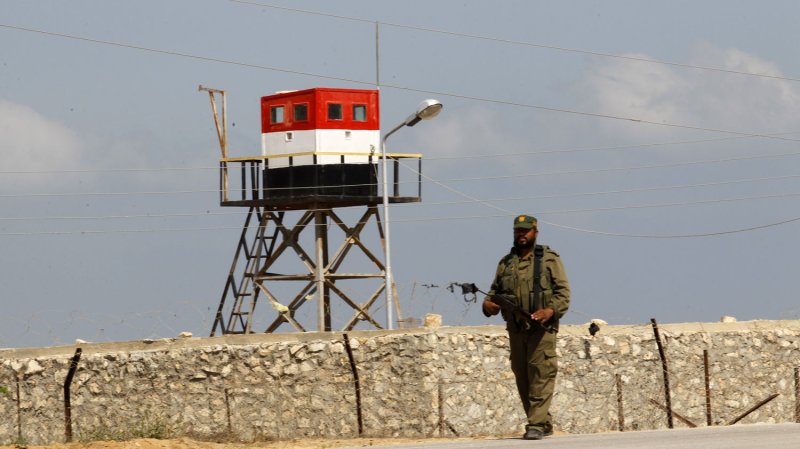A Hamas policeman (R) stands in Rafah in the southern Gaza Strip on the border with Egypt, on July 5, 2013. The Egyptian army closed the Rafah border crossing with Gaza after Egyptian Islamist militants fired rockets and directed heavy machine gun fire at a police base the previous day in the restive Sinai peninsula, security officials and witnesses said.UPI/Ismael Mohamad |
License Photo
CAIRO, July 9 (UPI) -- Scores of militants linked to Egypt's Muslim Brotherhood, now locked in an explosive confrontation with the Egyptian army over the ousting of President Mohamed Morsi, a Brotherhood leader, are reported to have moved into the Sinai Peninsula to fight the military.
They're expected to join forces with jihadist groups linked to al-Qaida who have established bases in Sinai's vast desert wastes since 2011 and are already clashing with Egyptian security forces.
This is taking place against a backdrop of mounting bloodshed in Egypt, where the military killed 51 people at a Brotherhood rally in Cairo Monday protesting what's widely seen as a military coup against Morsi, Egypt's first democratically elected president.
But there are wider ramifications. There are concerns the violence sweeping Egypt, the Arab world's most populous nation, could spill over into Israel on Sinai's eastern border, threatening its historic 1979 peace treaty with Egypt.
Israel's military and intelligence services are warily watching developments in Egypt and northern Sinai, where Israeli and Egyptian intelligence believe there are some 2,000 jihadist militants armed with weapons smuggled from Libya and operating with the support of many of the long-neglected 600,000-strong Bedouin tribes scattered across the peninsula.
Islamist militants have launched several attacks on the Jewish state from Sinai since the February 2011 downfall of Egyptian dictator Hosni Mubarak in a pro-democracy uprising, the event that led to Morsi's June 2012 election.
Former Israeli defense minister Gen. Binyamin Ben-Eliezer warned as Morsi was about to fall that Egypt was on the verge of a civil war.
Most Israeli leaders have said little about events in Egypt, with which Israel fought and won four wars in 1948-49, 1956, 1967 and 1973 to avoid inflaming the issue of the U.S.-brokered peace treaty, which has long been unpopular among Egypt's 82 million people.
But Ben-Eliezer, a close associate of Mubarak who staunchly supported the treaty, observed: "The situation in Egypt has reached a point of no return. It's the beginning of a civil war."
Israel has allowed Egypt to deploy a battalion of tanks on Sinai's border with the Gaza Strip, a Palestinian hotbed ruled by the fundamentalist Hamas movement, to prevent infiltration.
Egyptian forces have also destroyed dozens of underground tunnels between the southern Gaza town of Rafah and Egyptian Sinai, used by Hamas to smuggle in weapons and to infiltrate militants into the increasingly turbulent peninsula that links North Africa with Asia.
Under the peace treaty, Egypt can only deploy small military forces in Sinai, particularly in the eastern zone bordering Israel.
But the Israelis are giving the Egyptian military considerable leeway in moving forces close to Gaza because that increases security in Sinai, the main battleground in all of the Jewish state's wars with Egypt.
As the violence between the army and the Brotherhood, the two main powers in Egypt, continues to grow, the bloodshed's spread from Cairo to the cities of the Nile Delta.
In Sinai, there was a surge of attacks by militants. A soldier was killed early Friday in Rafah and gunmen attacked several army and police bases with rockets and machinegun fire, including the Mediterranean city of El Arish, the regional capital.
There have been persistent reports Morsi's government treated the jihadist groups in Sinai with kid gloves because of their ideological links and their common dream of restoring an Islamist caliphate in the Middle East.
Whatever the validity of those reports, Hamas, a Brotherhood offshoot, has been shaken by Morsi's ouster.
Its anti-Israel hardliners, like the jihadists in Sinai, appear to have been stiffened in their opposition to democratic politics by the toppling of Morsi just over a year after he made political history by becoming Egypt's first freely elected president after decades of sham elections that kept one dictator after another in power with implausibly huge majorities that often ran as high as 95 percent.
Morsi's departure is also a setback for moderate Islamist parties that have been emboldened or come to power because of the so-called Arab Spring, most notably in Tunisia, where longtime dictator Zein al-Abedin Ben Ali was driven out in January 2011.
But it has greatly bolstered jihadists' belief that power can only be achieved through holy war and bloodshed, not through the ballot box. And that may be the true legacy of Morsi's downfall.
Watch Syria.





